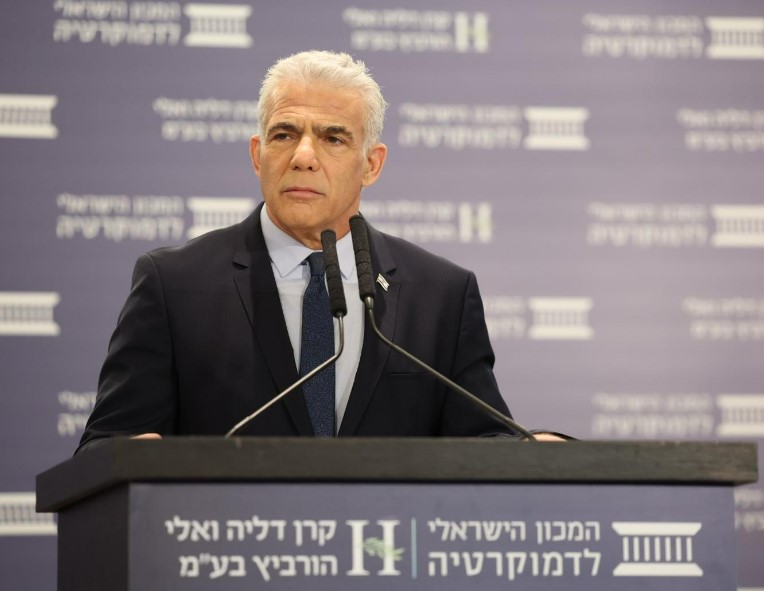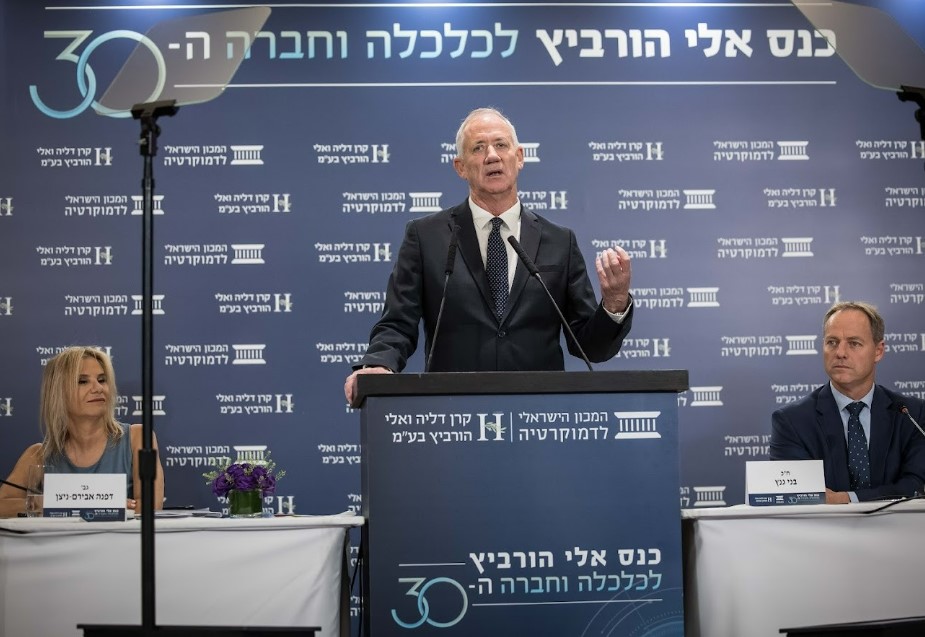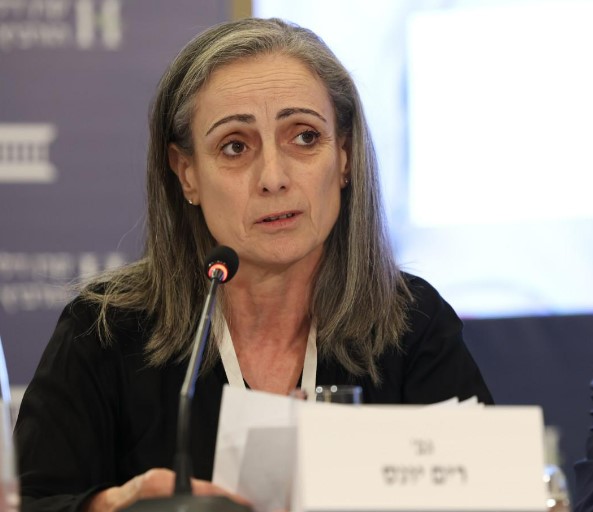The Future of Israeli High Tech - Eli Hurvitz Conference Day 2
“We can create a historic opportunity for what we call ‘the 75th Alliance’. In the 75th year of the state, seventy-five percent of Israel's citizens agree among themselves on 75 percent of the issues.” MK Yair Lapid, former Prime Minister and Leader of the Opposition

MK Yair Lapid | Credit: Oded Karni
The Eli Hurvitz Conference on Economy and Society second day opened today in Jerusalem with addresses by Former Prime Minister Yair Lapid, Former Defense Minister Benny Gantz, and senior leaders from the high-tech, public and private sectors.
MK Yair Lapid, former Prime Minister and Leader of the Opposition
“Together with the Likud we can create a historic opportunity for what we call ‘the 75th Alliance’. In the 75th year of the state, seventy-five percent of Israel's citizens agree among themselves on 75 percent of the issues.
Seventy-five percent of the country's citizens are national-liberal. Even in the current Knesset - which is the most extreme Knesset in the country's history - the Likud, Yesh Atid and the state camp together have 68 seats. If you add Yisrael Beitenu and the Labor Party, we reach 76 mandates.
This is the sane majority government that the State of Israel needs. An alliance of center-right, center-left and center people. A union of liberalism and nationalism. Judaism that is democratic, and democracy that is Jewish. A government that will work for everyone, even for those who don't vote for it.”

“I am a big believer in Israeli society, I believe that we are destined to live here as a united society even if it is not a uniform one. Ideas like “cantonization” and dividing the IDF, contradict my entire set of values, and in my view also the interests of the State of Israel. A large majority of Israelis agree on the common basis - a Jewish, democratic, safe, strong, just and fair state.
In recent years, the political center has been marginalized. This is what allows extortion and damage to the economy, this is what brings radical and messianic ideas damaging to democracy, this is what causes division. And so, our mission is for the center to lead and contain the edges.” MK Benny Gantz, Chair, National Unity Party said in his opening remarks.

Reem Younis | Credit: Oded Karni
The morning session focused on the future of the Israeli hi-tech sector.
Alan Feld, Co-Founder, Vintage Fund; Founder, "Power in Diversity Israel" – “In all 29 years that I’ve been here, I’ve never been so worried about the future of Israeli hi-tech as I am now. Allegedly, the last few years have been incredible for Israeli hi-tech. But when we look closer, the picture does not look so great. The rate of start-up initiatives, after reaching a record high of 1400 companies a year in 2013, has diminished to 700 in 2021, back to the 2009 rate.
This may be the worst year for fundraising since the 2008 economic crisis. It’s true, there is a global crisis, but the decline in Israel is sharper than the one in the US.
AI is the elephant in the room. It will not only change technology, it will change our lives and more than anything, it will change the job market. Two thirds of current jobs are exposed to some degree to risk of replacement by automation and one fourth might be completely replaced. The most studied subjects, such as the life, physical and social sciences, architecture and engineering, are at the greatest risk of automation.”
Dr. Yossi Vardi, Hi-Tech Entrepreneur – “High-tech does not exist in a vacuum, it is connected to the entire economy. Today we are at a crossroads. We are in danger! We are facing a terrible crisis - there will be no high-tech and there will be no foreign currency, there will be no money for anything. Put aside the quarrels and toxic talk, if we find a logical way to conclude the current national debate, we have a bright future."
Tal Barnoach, General Partner, Disruptive Venture Capital – “Economy and the high-tech industry need trust, stability and certainty. Today we are suffering from both the global crisis and the regime revolution, which is possibly causing irreversible damage to the industry in its early stages."
Reem Younis Owner and Cofounder of Alpha Omega – “We (Israeli society) need to look ourselves in the mirror, and every time we, as decision makers make a decision, we need to ask ourselves, does this decision serve all of Israel’s citizens or only parts of them? Are we mobilizing all of Israeli society to lead them forward? Who is being left behind? The decision to invest in all of Israeli society is the strongest engine for Israeli hi-tech.”
Michael Eisenberg, Managing Partner, Aleph Fund – "We need to bring the Israeli Jews who are at the cutting-edge home. We need to make a billion-dollar market capitalization in the next decade. We have to make sure that within a decade, every child in the eighth grade knows how to program… This is our civil responsibility, and it requires optimism and an enlistment on behalf of those working in the industry."
Gigi Levy-Weiss, General Partner at NFX – “I ask Israeli entrepreneurs, ‘are you creating new initiatives?’ And the answer I get is, ‘who has energy for that now?’ We need stability. This is the time to invest in education, and education is changing. It’s a new world and we need to invest in it. We still have time to correct this trend.”
Yifat Oron, Managing Director, Blackstone Israel – "We found that Israeli companies in the various fields, including high-tech, are unique and can generate very significant profits. I believe that Israelis want to live in Israel and establish their companies here. It is important that Israel will continue to be the right place for high-tech companies both in good and in difficult times. Israeli governments have known for decades to do this and it is important that we do not take our foot off the gas."
The Eli Hurvitz Conference on Economy and Society—formerly the Caesarea Economic Policy Planning Forum—is widely recognized as Israel's most influential economic conference. For 30 years, the Conference has served as a crossroads where public discourse and professional knowledge in economics and society meet, with the aim of improving the decision-making processes in the administration and improving the quality of Israel's social and economic policy for the benefit of the entire public.
The Eli Hurvitz Conference on Economy and Society, (May 30-31) was held with the participation of ministers and Knesset members, directors-general of government ministries and senior leaders from civil society, academia, as well as the public and private sectors.
A series of team-led research and policy recommendations on issues closely related to the conference sessions will be presented during the conference at the Orient Hotel in Jerusalem and online on IDI's website.
